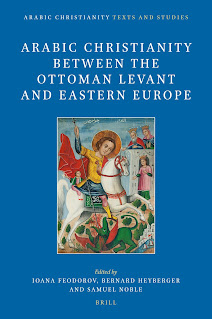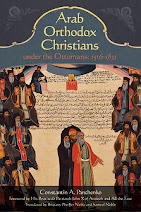Arabic original here.
Come, Follow Me
A man comes to the Lord to test Him. This man was good because he kept the commandments and followed all of them: thou shalt not steal, thou shalt not commit adultery, thou shalt not bear false witness... Nevertheless, the Lord said to him, "One thing you lack: sell whatever you have and distribute it to the poor... and come, follow Me." That is, you are not perfect if you have only kept the commandments.
If the poor have accept you in their hearts, then My Father will accept you in His kingdom. That is, if the poor are not pleased with someone, then God is not pleased with him. He who pleases the poor pleases God.
David said in the Psalm about the righteous man, "He has dispersed abroad, He has given to the poor; His righteousness endures forever" (Psalm 112:9). He did not say that he gave one thousand or five thousand lira as charity. He said "He has dispersed." What do we say today when the system is a system of seeking to accumulating money, the financial system and financial abundance? So long as this system exists, how can a person disperse? Our fathers, great theologians such as Basil the Great and John Chrysostom, said that each one of us is a steward of what he possesses. You are entrusted with your possessions for the common good.
The rich person is really the one in whose eyes God is great. He is fervent like the prophets, not a flatterer and not one who speaks idly. In our minds we must hold the rich and the poor to be equal. We must magnify those who follow the path of the prophets and be attracted to those who are righteous. The weak, the sick, the wretched, the needy and the outcasts in our society are the ones who are made great.
Why do people jealously guard what they possess? Why do they refrain from giving? It is because they fear death. They fear that they will meet death without any money in their fists. They know that they will go to the grave naked and barefoot, but they still do not learn. He who has seeks more, he who does not have seeks more, and it's all a race to be shrewd. It's all competitions for glory and the game ends in the grave.
So what should we do? We should open hearts to hearts. The issue is not one of us giving a little or a lot. The issue is that the heart must break before the sick, the weak, the outcast and the despised. The great issue is for us to consider ourselves as nothing. He who considers himself as nothing will be made something by his Lord. Hearts are closed and stony because they are proud. But one who wants to resemble Christ should consider himself as nothing. Our Lord was broken on the cross and trampled under the cross and so was lifted up to the highest heavens. Our great calling is to love people-- all people. Our great strength is that we lift them up over our own heads. Our honor is in that we love; it is in that we forget people's transgressions. You are great if people trample you down. When they persecute you, you know that you are loved by Christ. What is your concern with people. That they say something nice about you? This is a satanic temptation. "Woe to you when all people speak well of you" (Luke 6:26). This means that you desire praise. The righteous person rejects praise.
For us to enter into the kingdom means that we behold the good. The kingdom of God means love and truth. For us to enter into the kingdom means that we enter into the domain of truth, the domain of righteousness and that we are truly good. This means that our hearts are broken before all people, that we stand firm, that we love, that we obey, that we reach out in love to the ends of the earth, and that we open our hearts to let enter the poor, the oppressed, the outcasts and those who have no name, no glory and no honor. If they enter into our hearts and we become united to them, love them, and attached to them, at that point we will be like Christ and arrive at the apex of glory.
Come, Follow Me
A man comes to the Lord to test Him. This man was good because he kept the commandments and followed all of them: thou shalt not steal, thou shalt not commit adultery, thou shalt not bear false witness... Nevertheless, the Lord said to him, "One thing you lack: sell whatever you have and distribute it to the poor... and come, follow Me." That is, you are not perfect if you have only kept the commandments.
If the poor have accept you in their hearts, then My Father will accept you in His kingdom. That is, if the poor are not pleased with someone, then God is not pleased with him. He who pleases the poor pleases God.
David said in the Psalm about the righteous man, "He has dispersed abroad, He has given to the poor; His righteousness endures forever" (Psalm 112:9). He did not say that he gave one thousand or five thousand lira as charity. He said "He has dispersed." What do we say today when the system is a system of seeking to accumulating money, the financial system and financial abundance? So long as this system exists, how can a person disperse? Our fathers, great theologians such as Basil the Great and John Chrysostom, said that each one of us is a steward of what he possesses. You are entrusted with your possessions for the common good.
The rich person is really the one in whose eyes God is great. He is fervent like the prophets, not a flatterer and not one who speaks idly. In our minds we must hold the rich and the poor to be equal. We must magnify those who follow the path of the prophets and be attracted to those who are righteous. The weak, the sick, the wretched, the needy and the outcasts in our society are the ones who are made great.
Why do people jealously guard what they possess? Why do they refrain from giving? It is because they fear death. They fear that they will meet death without any money in their fists. They know that they will go to the grave naked and barefoot, but they still do not learn. He who has seeks more, he who does not have seeks more, and it's all a race to be shrewd. It's all competitions for glory and the game ends in the grave.
So what should we do? We should open hearts to hearts. The issue is not one of us giving a little or a lot. The issue is that the heart must break before the sick, the weak, the outcast and the despised. The great issue is for us to consider ourselves as nothing. He who considers himself as nothing will be made something by his Lord. Hearts are closed and stony because they are proud. But one who wants to resemble Christ should consider himself as nothing. Our Lord was broken on the cross and trampled under the cross and so was lifted up to the highest heavens. Our great calling is to love people-- all people. Our great strength is that we lift them up over our own heads. Our honor is in that we love; it is in that we forget people's transgressions. You are great if people trample you down. When they persecute you, you know that you are loved by Christ. What is your concern with people. That they say something nice about you? This is a satanic temptation. "Woe to you when all people speak well of you" (Luke 6:26). This means that you desire praise. The righteous person rejects praise.
For us to enter into the kingdom means that we behold the good. The kingdom of God means love and truth. For us to enter into the kingdom means that we enter into the domain of truth, the domain of righteousness and that we are truly good. This means that our hearts are broken before all people, that we stand firm, that we love, that we obey, that we reach out in love to the ends of the earth, and that we open our hearts to let enter the poor, the oppressed, the outcasts and those who have no name, no glory and no honor. If they enter into our hearts and we become united to them, love them, and attached to them, at that point we will be like Christ and arrive at the apex of glory.







